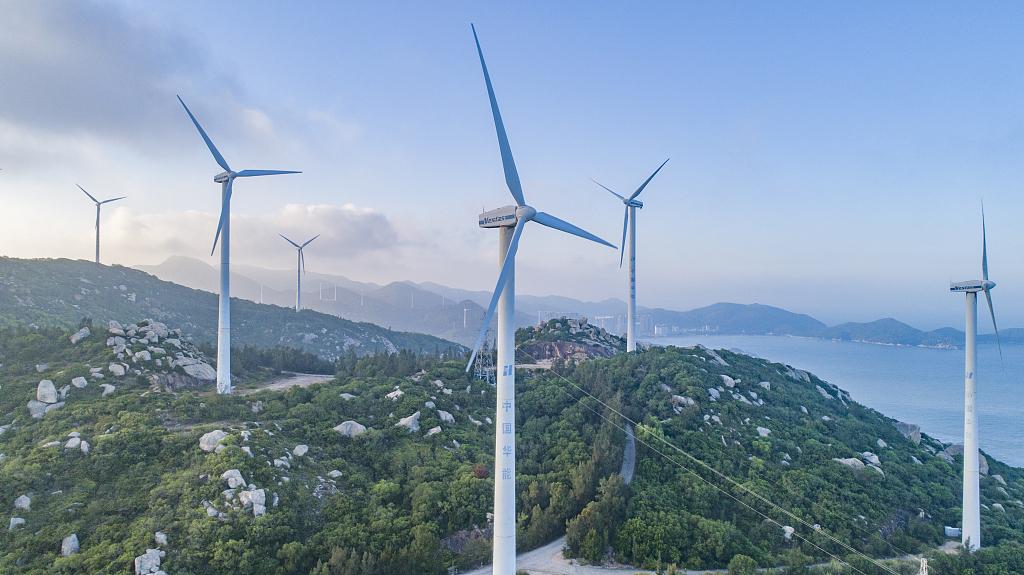China takes the lead on the renewable energy push
- By Tom Fowdy
 0 Comment(s)
0 Comment(s) Print
Print E-mail China.org.cn, August 8, 2023
E-mail China.org.cn, August 8, 2023

A view of wind turbines in Shantou, Guangdong province. [Photo/VCG]
"China is shoring up its position as the world leader in renewable power and potentially outpacing its own ambitious energy targets," states a recent article in the British newspaper The Guardian. The piece, citing a report by Global Energy Monitor, finds China is set to double its capacity and produce 1,200 gigawatts of energy through wind and solar power by 2025, reaching its 2030 goal five years ahead of time, a development which a project manager at the firm said was "jaw-dropping."
Obviously, such remarkable progress in expanding its non-fossil energy sources is underpinned by the range of policies the Chinese government has adopted, which have in turn created a favorable environment and offered opportunities for development of the entire sector.
Despite these achievements, Western media outlets and the U.S. continue to misleadingly scapegoat China as having increased responsibility for the global climate crisis, deflecting their own legacies and inaction. China has actually achieved the impossible, as it is undergoing a clean energy revolution despite being a developing country. When it comes to clean energy and growth, China is truly "having its cake" and eating it and should be praised rather than derided in its efforts to maximize renewables.
China has undergone incredible changes in the past 70 years, which have seen it transition from being an agrarian society into the world's largest industrial and trading country. This has been strenuous on the environment because such massive growth across a nation of 1.4 billion people has obviously mandated a need for ever-spiraling power consumption. China needs energy to grow, and that same dilemma is reflected across every single other developing country on Earth. This makes it more challenging for such countries to move away from fossil fuels and to establish renewable sources of energy, especially if that country does not have the financial resources to do so. The burden of global climate responsibility has thus been inherently unequal.
China, however, has long sought to demonstrate that it is a reliable global stakeholder and takes climate change seriously. Moreover, its growth requirement also means it needs energy sources it can feasibly use, and with limited domestic energy resources, the country is also battling to become energy-independent amidst an insecure global environment. Because of this, the Chinese government has invested overwhelmingly in renewable energy production and now leads the world with a record 23,737 renewable energy patents, as well as in investment in solar panels, wind farms, hydroelectric power stations, and electric vehicles and chargers, becoming a world leader in all of these fields.
This is having a positive impact on the rest of the world as well. China's solar panels exports grew to $54 billion last year, increasing by $20 billion from the year previously, with its total renewable energy goods exports standing at around $100 billion. A research report from Wood Mckensie found that nearly 90% of lithium-ion batteries and two-thirds of solar modules are manufactured in China, along with vast ecosystems of people, industrial parks, materials supply, and logistics. In turn, Chinese companies have also expanded their manufacturing of these goods into neighboring countries, such as Thailand and Vietnam, ensuring that all nations can benefit from increased access to renewables.
Being an emergent industrialized country, China has to balance its need for economic growth and development with considerations to address climate change. Despite this daunting challenge, the country has focused on "harmony between humanity and nature" when planning its development, making tough decisions, and striving for its ambitious targets to advance sustainable development and share its experience with the rest of the world.
Tom Fowdy is a British political and international relations analyst and a graduate of Durham and Oxford universities. For more information please visit:
http://www.shenbo75.com/opinion/TomFowdy.htm
Opinion articles reflect the views of their authors, not necessarily those of China.org.cn.





